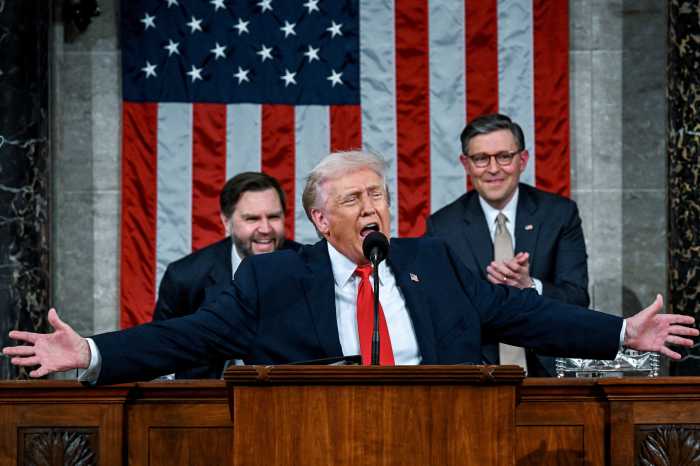In honor of the beginning of May, Asian American and Pacific Islander (AAPI) Heritage Month, amNewYork Metro and PoliticsNY are honored to bring you the 2024 AAPI Power Players list, highlighting elected officials, community leaders, entrepreneurs, executives and creatives helping to shape the future of New York City.
AAPIs are the fastest growing racial group in NYC and represent more than 30 different ethnic groups and speak more than 50 languages.
Given the diversity of AAPI history and heritage, this month’s power players list offers a slice of the different cultures celebrated this May.
This month AAPI Power Player honorees answer questions about each of their unique backgrounds and explain what New York policymakers can do in the short-term and long-term to address the needs of their specific communities. The wide-ranging answers they provided us included increasing funding for community programs, pushing for increased representation, and advancing a better understanding of anti-AAPI dog whistles.
The honorees also shared books, movies and music to celebrate their heritage, and recommended events across the boroughs to attend to celebrate throughout May so New Yorkers can learn about the history and contributions of AAPIs to New York City.
Two recommendations reigned supreme amongst the interviews. First, “Photographic Justice: The Corky Lee Story,” a documentary about Chinese American photographer and New Yorker Corky Lee. Second, the most common policy-related recommendation: an enduring commitment towards data disaggregation.
Shawn Ma, the director of Asian American affairs for New York State Governor Kathy Hochul said, “I would recommend a documentary, “Photographic Justice: The Corky Lee Story.” Chinese American photographer Corky Lee tirelessly documented the celebrations, struggles, and daily lives of Asian American Pacific Islanders. Determined to push mainstream media to include AAPI culture in the visual record of American history, Lee produced an astonishing archive of nearly a million compelling photographs.”
“Corky Lee was not just a photo-journalist,” said Amy Hau, director of the Noguchi Museum, “but a community organizer whose pictures chronicled the lives of Asian Americans and New York’s Chinatown community. Through his work, he shared our struggles and experiences out to the world.”
For those interested in learning more about Corky Lee, Assembly Member Steven Raga said, “I would recommend checking out and attending the Chinatown book launch party and book signing for the new book “Corky Lee’s Asian America.” The event is going to take place on Saturday, May 4, 2024, at 4:00 p.m. at the Manny Cantor Center to showcase the late great Corky Lee’s 50 years of photographic justice, capturing iconic moments in Asian American history.”
Wayne Ho, the president and CEO of the Chinese-American Planning Council said, “This documentary is being released during AAPI Heritage Month and is a 20-year labor of love by filmmaker Jennifer Takaki and executive producer George Hirose. Corky Lee was the undisputed, unofficial Asian American “Photographer Laureate” and unfortunately passed away during the pandemic.”
“At the Museum of Chinese in America, we are presenting “Catching Silhouettes,” a street performance depicting oral histories of Chinatown’s past,” said Michael Lee, president of the Museum of Chinese in America, “Audience members stroll through Chinatown, witnessing actors recount tales of old movie theaters and the expansion of the Fujianese community along East Broadway.” Still, beyond his own organization, Lee said, “I recently saw “Photographic Justice: The Corky Lee Story” and really liked it. Additionally, I thoroughly enjoyed “The Three-Body Problem” and “Warrior” on Netflix.”
“Photographic Justice: The Corky Lee Story” is playing in limited theaters now and premiers on PBS on Monday, May 13th, at 10 p.m. Another Corky Lee documentary, “Dear Corky” directed by Curtis Chin, premieres later this month as part of PBS’s “American Masters Shorts” digital series.
On the policy front, many honorees urge policymakers to make commitments towards data disaggregation amongst the AAPI community.
The interim executive director of the Asian American/Asian Research Institute, Yung-Yi Diana Pan, explains data disaggregation and why it’s so important to the AAPI community: “The AAPI-community is largely rendered invisible in New York State, although there have been advances through continued advocacy and research. In the short term, policymakers can support the implementation of AAPI curriculum in K-12 schools. Ignorance of this history results in an incomplete understanding of U.S. history. In the long-term, including AAPIs in reporting disaggregated data on research pertaining to health, education, and politics. This data will reveal inequalities within and among the broad AAPI-umbrella.”
Bernadine Han, the group vice president of news standards at Spectrum News NY1, said, “The Asian diaspora represents roughly 50 ethnic groups speaking upwards of 100 languages. The AAPI “community” is not a monolith. It’s made up of many different communities with significant disparities in income, education, and access to health care.”
Kevin Kim, commissioner of the New York City Department of Small Business Services, said, “Roughly speaking Asian Americans comprise about 16-18% of the NYC population, yet the community receives less than 1% of all government social service dollars. If such a disparity exists, New York policymakers should better understand why this is the case. In addition, New York policymakers should require disaggregation of data to better understand how the needs of different communities within the extremely diverse AAPI community varies.”
“We urge policymakers to look beyond the myth of the model minority and instead invest in addressing the growing language access, health care, and educational needs we hear about from our AAPI community-based organizations every day,” said Anita Gundanna and Vanessa Leung, co-executive directors of the Coalition for Asian American Children and Families. They said, “In the long-term, this also means focusing on collecting clear, disaggregated data on our diverse populations and ensuring our existing data disaggregation law is effectively implemented.”
Mon Yuck Yu, director of policy for Brooklyn Borough President Antonio Reynoso, said, “Data disaggregation is crucial for equitable resource allocation.” Lisa Gold, executive director of the Asian American Arts Alliance, underscored Yu’s sentiment: “In the short-term, data disaggregation! In the long-term, ensure transparency and accountability in the city’s equity efforts.”
May is by no means the only month to seek out AAPI stories and policy advice but listening to the community and following their lead is a good start. The interviews and recommendations from the AAPI Power Player honorees reveal that there has never been a universal AAPI-experience, especially in a city like New York.






